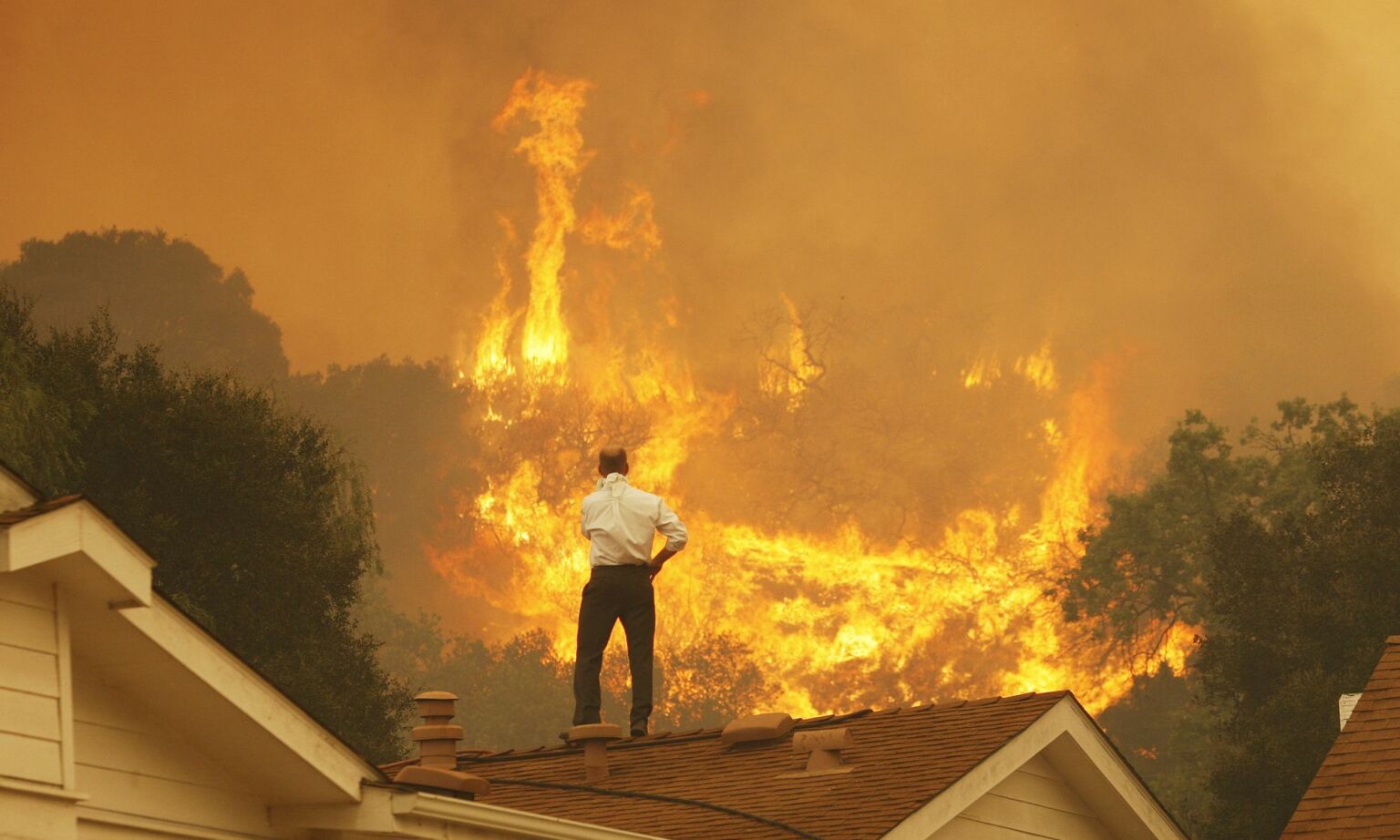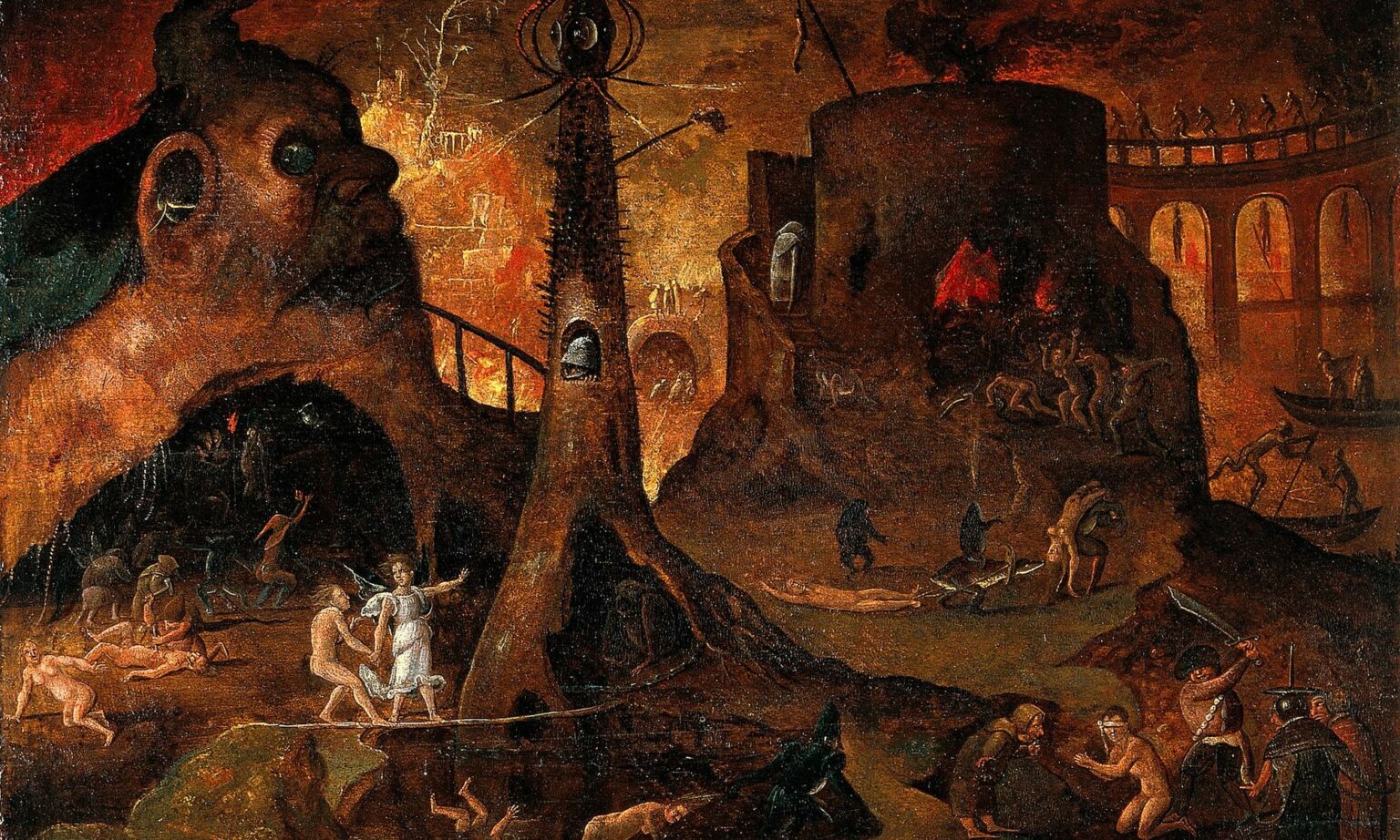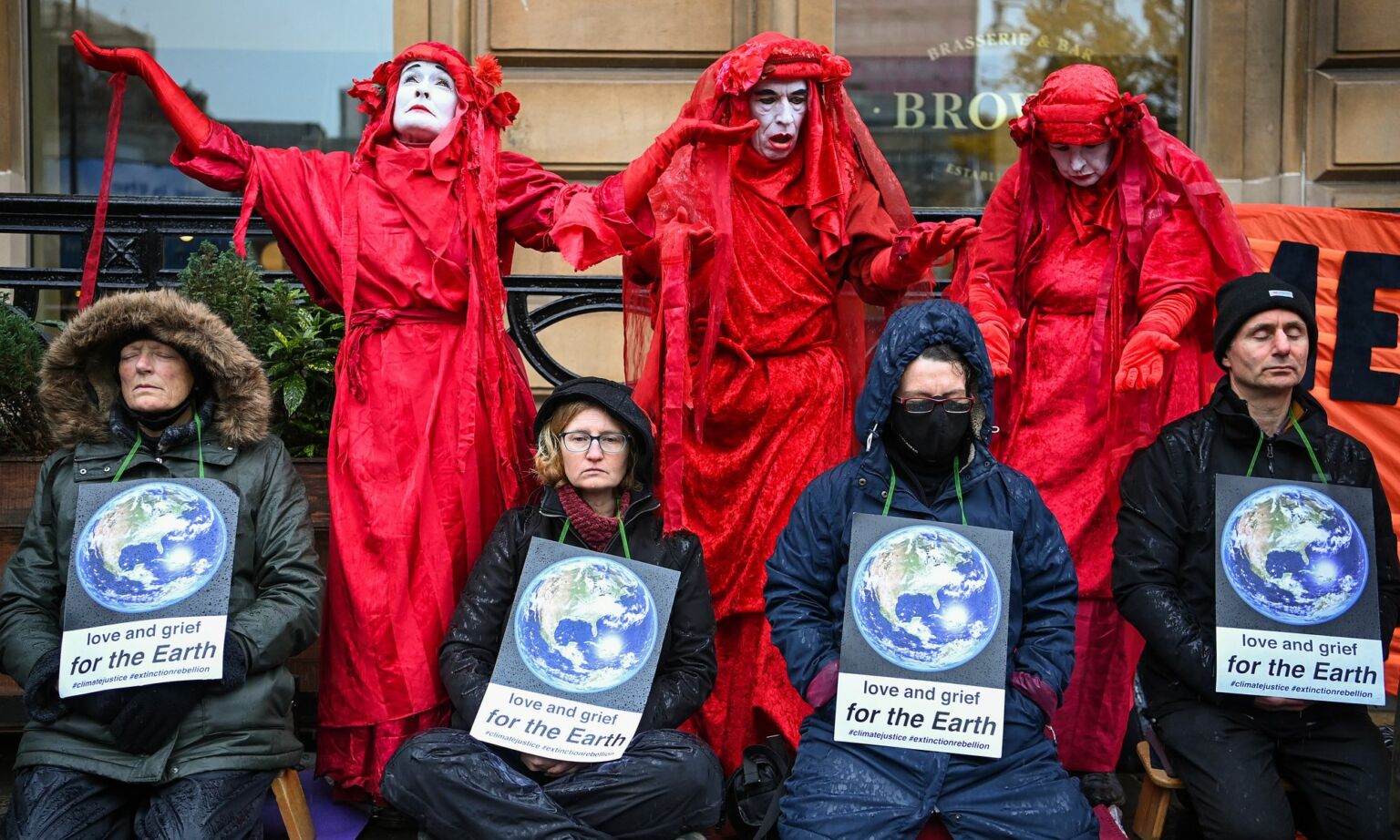
Long-read
The cult of the climate apocalypse
Green campaigners are not ‘following the science’ – they are promoting a Biblical fantasy.
Want to read spiked ad-free? Become a spiked supporter.
The End Times are back once more. The latest Intergovernmental Panel on Climate Change (IPCC) report, published this week, prompted a typically apocalyptic response in the media and beyond. ‘It’s our last chance to limit global warming before climate-change damage becomes irreversible’, ran one headline. ‘Act now or it’s too late’, was the Guardian’s measured assessment. It might as well have said, ‘Repent sinners, the end is nigh’.
This swerve into almost religious rhetoric is no one-off. Mainstream climate-change coverage and activism are now dominated by the apocalyptic imagination. Indeed, the belief that humanity is facing possible extinction in the next century or sooner lies at the heart of the propaganda of Extinction Rebellion (XR) and its spin-off, Just Stop Oil. During interviews, and increasingly court appearances, activists present themselves as distressed and angered by the complacency of the public. Time is running out, they say frantically.
The apocalyptic nature of so much of contemporary environmentalism is no mere rhetorical flourish. It seems to structure the thought and outlook of activists. To grasp why apocalyptic thinking seems to resonate so strongly with hardline environmentalists, it is worth looking at the ancient, indeed Biblical, origins of this thinking – in which fantasies of vengeance and the promise of a world redeemed were first forged.
Apocalypse then
The apocalypse tends to be understood today as a terminally violent event, like catastrophic global warming. But that wasn’t always the case. Apocalypse originally meant a revelation, a prophecy of things or events unknown that would appear to someone in dreams, visions or via angels. A belief in a revelation, a day of judgement and subsequent kingdom of God, predates Christ and can be found in Persian and Greco-Roman literature as well as in Jewish and Christian literature. This terminal trinity – revelation, judgement day and a subsequent kingdom of God – was said to answer for the sins of humankind.
In the final book of the New Testament, Revelation, subtitled ‘The Revelation of St John the Divine’, the apocalypse appears to a prophet. He foresees God’s vengeance upon a sinful, dying world. God’s wrath culminates in Armageddon, a final battle between good and evil.
It is richly symbolic, of course. But there are traces of the literal world there, too. The word Armageddon, for instance, is believed to be derived from the ancient city of Megiddo, an old battleground on Israel’s northern plain. This is not incidental – it is part of the defining political context of Revelation. From about 730 BC, the Israelites experienced centuries of occupation by Syrians, Persians, Greeks and Romans. And they fought back for centuries, too. Indeed, Jesus would have spent most of his life in the theatre of one of history’s fiercest guerrilla uprisings. And it’s in the context of this almighty struggle that the apocalyptic imagination flourished.

‘The cult of the vengeful messiah’, wrote New Testament scholar Bart Ehrman, ‘was rooted in the practical struggle against Roman colonialism’. Centuries before Christ, Israelites began to hope and believe a messiah would come to destroy the colonisers. Christ was just one of a series of messiahs, and he was not always for turning the other cheek – in Luke’s Gospel, Christ says: ‘He who hath no sword, let him sell his garment to buy one.’
Indeed, Flavius Josephus, a 1st-century Romano-Jewish historian and military leader, claimed that Jesus was one of five Jewish rebel leaders who lived between 40 BC and 73 AD. He was involved in the First Jewish-Roman War (66-73 AD), which ended with the destruction of Jerusalem and, according to Josephus, the murder of up to a million Jews and the enslavement of nearly 100,000 others.
The Jews’ defeat coincided with the completion of the earliest Gospels beginning with Mark. According to anthropologist Marvin Harris, the Roman victory prompted early Christians to deny that their cult had arisen out of ‘the Jewish belief in a messiah who was going to topple the Roman Empire’ (1). And so Jesus was reconceived as a pacifist, and the writings of Roman-to-Christian convert Paul helped obscure the Jewish messianic origins of the Jesus movement.
But those messianic origins clearly persist in Revelation. The final book of the New Testament can be read as a revenge fantasy – as fictional payback for the catastrophic defeat suffered by Israelites at the hands of Romans. ‘And when the Lamb opened the fifth seal’, reads Revelation 6:9, ‘I saw under the altar the souls of those who had been slain for the word of God and for the testimony they had upheld. And they cried out in a loud voice, “How long, O Lord, holy and true, until You avenge our blood and judge those who dwell upon the Earth?”.’
As Christianity spread, so did the fantasy of the apocalypse – it entered Islam in the Koran and the Hadith. The great Christian thinker, St Augustine (354-430), developed the apocalyptic theme, by calculating that the end of the world would be some 300 hundred years after his lifetime. Thereafter, bishops, monks, mystics and a pope made further predictions. By the Middle Ages, the Second Coming was already a thousand years overdue, so certain Christian factions decided to try to bring it about. This was partly the impetus behind the systematic violence of the Crusades.
The greening of the apocalypse
Apocalypticism may have developed hand-in-hand with religion and Christianity in particular. But it has persisted as a mode of thinking among certain sections of society, even as Christianity’s influence has waned. Indeed, as societies have become more secular, so apocalyptic thinking has become more secular, too.
We see this today, above all, in the case of environmentalism. For it’s there that apocalyptic projections and predictions are now most at home. Greenism shares with its Biblical precursor an obsession with days of judgement, with vengeance upon the wicked and the dream of a redeemed world. But there’s a vital difference between the Biblical apocalypse and its green iteration. Those to be judged today are not a portion of sinful humanity. No, they are all of humanity. And the redeemed world dreamt of by climate activists is not the kingdom of God promised by earlier apocalyptic narratives. Instead, it is a kingdom of nature, and it is distinctly opposed to humanity. In short, the green End Times amount to a very anti-human apocalypse.
At the forefront of the arms race in catastrophic prophecies is Extinction Rebellion. Every page on its website itemises the scale of the climate crisis, and the dire impact that human development supposedly has on life on Earth. The extinction referred to in the movement’s title does not just include wildlife, but humanity itself. Activists claim that our extinction is just a generation away.
Here is a literally hopeless creed. XR and its apocalyptic ilk do not seem interested in climate change as a practical challenge – as something that can be addressed with technological and material development, as environmental problems have been mitigated in the past. Instead, they see climate change as a form of necessary punishment. As XR co-founder Roger Hallam puts it in one blog post, XR members must ‘understand that redemption only comes through suffering and the only honourable life is to move into that suffering in an act of faith that there will be another side to come out of, into a state of grace’.
As these words show, XR is effectively an apocalyptic cult. That’s why XR’s propaganda has more than a touch of the Book of Revelation about it. A 2021 XR video is titled ‘Advice to Young People as they face Annihilation’. One blogpost by Hallam begins ‘In these End Times…’. Another exclaims: ‘Only when we admit the utter destitution of our souls at this time of utter annihilation will we begin a journey we can be proud of, regardless of the outcome.’ These are not the words of a political campaigner. They are the words of a self-styled prophet.

Climate change poses a challenge to humanity. But green apocalypticism does not help anyone. It inspires panic in those who buy into it, especially young people. They then see it as their job to wake us all up, to make us see what they see, to reveal the coming Armageddon. As far as they are concerned, this righteous mission trumps everything else. And it culminates in ill-thought-out, knee-jerk actions, such as climbing the gantries on the M25 to bring traffic to a halt. After all, we must be made to see the error of our ways. And if we don’t, we deserve the punishment that is surely coming.
The quasi-religious hectoring of Hallam is unrelenting. From Hallam’s point of view, there is no choice but to repent – that is, to try to bring down the government and bring modern life to halt. This was the apocalyptic strategy of his now defunct political party, Burning Pink. ‘Anything less than this is virtue-signalling and posturing’, he wrote in a 2021 blog post, in which he also denounced the ‘reformist elites’ for their ‘complicity… in mass murder’.
The zealous, unreasoned activism this kind of thinking promotes is bad enough. But the second effect of this environmentalist apocalypticism is arguably even more damaging. Casting human history and humanity’s achievements as effectively sinful, abominable, indeed fallen, can only demoralise people. It contributes to a broader societal pessimism that undercuts any prospects for positive social change.
You can see this in the way that mainstream politicians, trying to burnish their green credentials, now criticise the Industrial Revolution. At COP26 in Glasgow in 2021, then prime minister Boris Johnson declared that British innovators during the Industrial Revolution were the original perpetrators of climate sin – and that Glasgow was the source of the climate crisis. ‘It was here, in Glasgow 250 years ago, that James Watt came up with a machine that was powered by steam, that was produced by burning coal’, Johnson said. ‘And yes, my friends, we have brought you to the very place where the doomsday device began to tick.’ That was how he chose to describe an innovation (the steam engine) that transformed the lives of millions for the better – as a source of our coming doom.
No wonder that some eco-radicals claim that Britain should pay reparations for the Industrial Revolution, even though it was a giant leap forward not just for Britons, but for mankind the world over. Both the radical and elite wings of green politics adhere to the apocalyptic narrative that demands an absolute break from the past – because it is seen as so sinful.
Given this denigration of the achievements of humanity, it is no surprise that Just Stop Oil activists are happy to attack canonical artworks, from Renaissance artists like Vermeer to modernist greats like van Gogh. As far as these eco-zealots are concerned, everything humans have achieved is worthless, in the unforgiving light cast by the coming day of judgement.
As in Biblical times, it seems the green apocalypse is playing the role of a revenge fantasy once again. But it is no longer the fantasy of an oppressed people wishing harm on their oppressors. It is the revenge fantasy of a minority of activists wishing harm upon humanity – for not agreeing with them, for not waking up to their sinfulness, for not repenting.
In sum, green apocalypticism is a deeply anti-human narrative. By casting the achievements of humanity as sinful, it deprives us of many of our sources of strength and of hope. That’s why it must be resisted. We should look around us, and over our shoulder, at the enormous ingenuity and resourcefulness that human beings have shown in the past, and continue to show today. We are making advances in all areas of human knowledge, from energy to medicine to transport and space travel. Nature has never been as unthreatening as it is today.
All of this ought to call into question today’s green apocalypticism and the climate of pessimism it has fostered. And it should remind us that the future is not foretold and that reports of our imminent demise are, as ever, greatly exaggerated.
Michael Crowley is an author and dramatist. Visit his website here.
(1) Cows, Pigs, Wars and Witches, by Marvin Harris, Random House, 1974
Pictures by: Getty.
Who funds spiked? You do
We are funded by you. And in this era of cancel culture and advertiser boycotts, we rely on your donations more than ever. Seventy per cent of our revenue comes from our readers’ donations – the vast majority giving just £5 per month. If you make a regular donation – of £5 a month or £50 a year – you can become a and enjoy:
–Ad-free reading
–Exclusive events
–Access to our comments section
It’s the best way to keep spiked going – and growing. Thank you!






Comments
Want to join the conversation?
Only spiked supporters and patrons, who donate regularly to us, can comment on our articles.